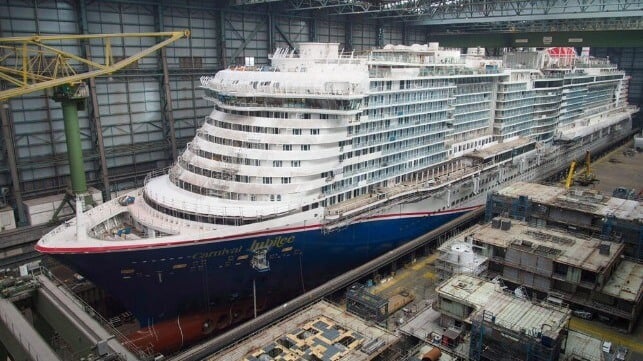Meyer Werft Agrees with Union to Reorganization as Part of Proposed Bailout

Germany cruise ship builder Meyer Werft and the union IG Metall reached important agreements as the first step toward a proposed reorganization and bailout of the financially troubled yard in Papenburg, Germany. Meyer Werft is facing with a liquidity crisis as an after effect of the pandemic and rising costs.
The company is in negotiations with the state government to provide critical loan guarantees for the next few years. While the Papenburg shipyard was able to maintain its orderbook during the pandemic and has added to it with new contracts, it faces a cash shortage in order to build and deliver these cruise ships. Typically, the cruise lines provide a 20 percent upfront payment with the order and the shipyard must finance the materials and pay employees and contractors during the construction period.
The company and union announced their agreements at a press briefing in Papenburg this afternoon, July 3. The union has agreed to job cuts for 340 employees at the Papenburg yard, down from an original proposal to cut 440 positions immediately. Further, the shipyard agreed to attempt to avoid layoffs. It will not renew 100 temporary positions when they expire and will launch a voluntary separation scheme. If by April 2025 they have not reached the 340 number then layoffs may be implemented.
Meyer Werft made several key concessions which CEO Bernd Eikens called “important building blocks,” for the future. The company agreed to relocate its headquarters, which have been in Luxembourg since 2015, back to Germany. Following the required structure for German companies, they will institute both a supervisory board and a group works council in the “near future.” The Papenburg shipyard also agreed to a minimum staffing level of 3,100 employees, including at least 1,200 in production, through 2030.
Meyer Werft is a large employer in Germany’s Lower Saxony region and supports a broad network of contractors and suppliers. Estimates are that at least 10,000 jobs are associated with the shipyard’s work.
Eikens said today’s agreements will be followed by “further steps” in the next few days. He took the reigns of the company from the Meyer family in December 2023 and has brought in a reorganization specialist. He has said the shipyard must and will become more profitable.
Meyer Werft is reported by the German media to be seeking €270 million in financing with government loan guarantees to carry the company through 2027. The state government has expressed its support for the company while calling for the reorganization steps that were agreed to today. However, they will also need the support of the federal government due to the size of the proposed guarantees. The media reports that Meyer is also looking for investors and may require as much as £400 million in new capital.
The German news outlet NDR is reporting that talks are beginning today with the Federal Ministry of Economics. Two of the leading political wings have expressed their support for the discussions and concern over the potential impact on jobs. Media reports are saying that a deal must be reached by September to shore up the weak finances of the Papenburg yard.

that matters most
Get the latest maritime news delivered to your inbox daily.
The broader Meyer Group, which also has shipyards in Turku, Finland and Rostock, Germany, is reported to employ 7,000 people. The bailout is focused on Papenburg.
Meyer has recently expanded its work winning its first contracts for offshore platforms. It is also contributing to the construction of a German research vessel. The yard traces its origins to Willm Rolf Meyer, who started building small wooden sailing boats in 1795 in Germany. It transitioned into cruise ships in the 1980s after a downturn in the tanker market and today is one of only three major builders in Europe for large cruise ships.
